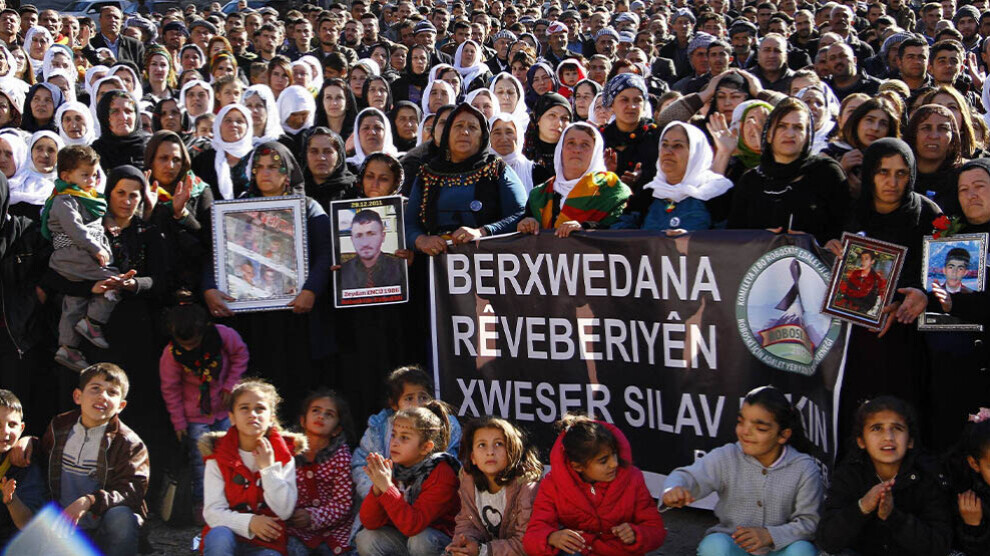Acquittal for Roboski families
The trial against 16 relatives of the victims of the Roboski massacre, who were accused of "terror propaganda" because of their participation in a commemoration event, has ended with an acquittal for the defendants.
The trial against 16 relatives of the victims of the Roboski massacre, who were accused of "terror propaganda" because of their participation in a commemoration event, has ended with an acquittal for the defendants.

The trial of several relatives of the victims of the Roboski massacre for alleged terrorist propaganda ended on Monday with an acquittal. The criminal court in the provincial capital Şırnak concluded that no criminal offence had been committed and acquitted all defendants. The trial had already been dragging on since the end of 2019. The pronouncement of the verdict, scheduled for the beginning of October, was postponed at short notice.
Sixteen people from the village of Roboski (tr. Ortasu) were accused of taking part in a commemoration ceremony for their killed relatives. The charge was "propaganda for a terrorist organisation" - meaning the PKK. The ceremony had taken place four years after the massacre. The public prosecutor's office considered several slogans on banners such as "Self-government instead of massacre - peace instead of war" as alleged offences. The trial caused anger and indignation in Kurdish society. However, it was not the only trial against the Roboski families.
The criminalised memorial event on 28 December 2015 in Roboski was dedicated to the human rights lawyer Tahir Elçi, who had been shot dead by the police in Amed (Diyarbakir) exactly one month earlier. The legal representative of the Roboski families stated that the state wanted to take revenge on the dead of a people with the trial.
The massacre
On 28 December 2011, a total of 34 civilians were killed in an air strike by the Turkish army near Roboski. Nineteen of the victims were minors, four survived with serious injuries. The massacre took place shortly before the New Year. The young men, aged between thirteen and 38, whose families lived from border trade, had just returned from southern Kurdistan (northern Iraq). Their donkeys were loaded with petrol cans, tobacco products and sugar. The shelling by Turkish fighter jets began at 9.37 pm and continued until 10.24 pm. In the end, many of the mainly young civilians and their donkeys were literally torn to shreds.
The Turkish general staff later explained that the decision was made to attack them since the group had taken a route also used by the PKK, so they had been considered "terrorists". Hours before the first air strike, however, drone images had already been analysed at 6.39 p.m., in which the people were clearly recognisable as border traders. The local military police (gendarmerie) were also aware of each group of smugglers, as they collected illegal customs duties.
In any case, the guerrillas do not use large routes like the border traders and do not move in such conspicuous groups with mules. The military leaders in charge in Ankara must also have been aware of this. The current head of state, Recep Tayyip Erdoğan, who was prime minister at the time, promised to clear up the incident. However, it was also Erdoğan who personally thanked the Chief of General Staff for the bombing.
No legal reappraisal
Although more than ten years have passed, none of those responsible for the Roboski massacre has been brought to justice. The legal handling of the crime is emblematic of the judiciary in Turkey: all trials that have been brought before civil and military courts to deal with the massacre have, without exception, been discontinued. After all legal avenues at home had been exhausted, an application was made to the European Court of Human Rights (ECtHR). Because the legal counsel of the victims' families had submitted missing documents two days too late, the ECtHR rejected the application in May 2018. An application for a retrial submitted to the Constitutional Court in Ankara almost a year ago has not yet been answered.
Punishment of relatives and survivors
The judiciary, on the other hand, takes action against the victims or the survivors of the massacre. Veli Encü, who lost his brother Serhat in the air strike, and Barış Encu, whose brother Nevzat died, are in prison for protesting against the massacre. Veli Encü was sentenced to five years in prison. He has been in prison for almost three years and further cases against him are pending. Barış Encü has also been in prison for almost three years; he was sentenced to over six years imprisonment for posts on social networks. There are also proceedings against 34 people from Roboski for protesting against the then district governor, Naif Yavuz. The charges are "terrorist organisation propaganda, insulting the army and attempted murder". Dozens of relatives have already been sentenced to fines.